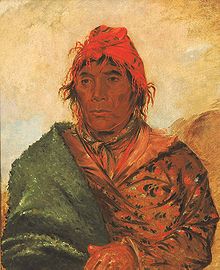Ee-mat-la
Appearance

Ee-mat-la, also known as King Philip, (died 1839) was a Seminole chief during the Second Seminole War.
He was captured while camped at Dunlawton plantation,[1] and held at Fort Marion. He died while being transported west in 1839.[2]
He was "also a very aged chief, who has been a man of great notoriety and distinction in his time, but has now got too old for further warlike enterprize."[3]
The long shirts with wide collars were apparently used through the Second Seminole War, to judge from Catlin's paintings. Not one of his seven portraits of adult Seminole males clearly show a cape of any kind, while a couple do show wide ruffled collars ("Mick-E-No-Pa" SILP#203, "Ee-Mat-La" SILP#209).[4]
His son was Wild Cat (Seminole).
References
- ^ Joe Knetsch (2003). Florida's Seminole wars, 1817-1858. Arcadia Publishing. pp. 104–105. ISBN 978-0-7385-2424-5.
- ^ Bruce E. Johansen and Donald A. Grinde, Jr. The Encyclopedia of Native American Biography, New York: Henry Holt and Company, 1997.
- ^ "LETTER—No. 57". Letters and Notes on the Manners, Customs, and Conditions of North American Indians, George Catlin, (First published in London in 1844)
- ^ "The Seminole Longshirt The Seminole Longshirt" 19th Century Seminole Men`s Clothing, M. E. (Pete) Thompson and Rick Obermeyer, NativeTech: Native American Technology and Art
External links
- Ee-mat-la, Catlin sketch, Ayer Art Digital Collection (Newberry Library)
- Seminolee. 154-156. Ee-mat-la (King Phillip), Ye-how-lo-gee (the Cloud), Co-ee-ha-jo (- - -), three Seminolee warriors w... (1850), NYPL digital library
- ee-mat-la, George Catlin, Smithsonian American Art Museum
- Ruins of sugar mill, Dunlawton plantation
- FLORIDA 32) Dunlawton Plantation Sugar Mill Ruins, National Register of Historic Places
- Battle of Dunlawton Plantation - Port Orange, FL
